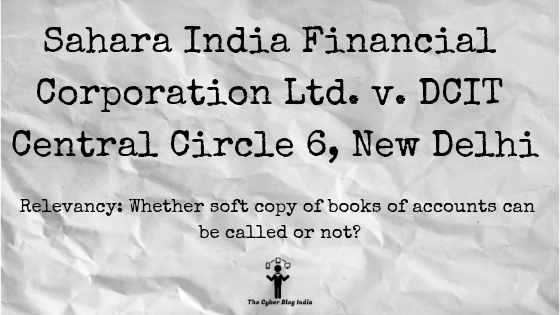Sahara India Financial Corporation Ltd. v. DCIT Central Circle 6, New Delhi

Sahara India Financial Corporation Ltd. v. DCIT Central Circle 6, New Delhi
2014 Indlaw ITAT 4
In the Income Tax Appellate Tribunal Delhi Bench
ITA No. 3199/Del/2013, ITA No. 3512/Del/2013
Before Justice R. P. Tolani and Justice B. C. Meena
Decided on Jan 10, 2014
Relevancy of the case: Whether soft copy of books of accounts can be called or not?
Statutes & Provisions Involved
• The Information Technology Act, 2000 (Section 2)
• The Income Tax Act 1961 (Section 40, 68, 142)
Relevant Facts
• Assessee (petitioner) firm is an RBI registered Residuary NBFC engaged in the activity of collecting deposits mainly from rural parts of India from small depositors, under various schemes like daily, term and recurring deposits etc. It filed its return of income for the annual year declaring total loss at Rs.9,99,48,394/-. Subsequently, a revised return was filed on 28.03.2011 showing a loss at Rs.10,45,98,718/-.
Prominent Arguments by Advocates
• Shri Ajay Vohra, the learned counsel for assessee contended that CIT(A), deleted the aforesaid disallowance by observing and verifying the record and holding that assessee demonstrated business expediency. There was consistent practice amongst the group companies not to pay interest on the mutual outstanding balances as the transactions were frequent and business oriented. In any case, assessee in this year is rather a beneficiary in these terms, as it has received overall more interest-free funds.
• The counsel submitted that as part of its business, the appellant holds investments in various securities, in the nature of stock-in-trade and are consistently valued at low market value. The auditor (AO) disallowed the provision for diminution in the value of the current investment on the ground that the appellant had treated all income earned from investments as business income. The counsel contended that, on facts and in law Section 14A disallowance, isn’t sustainable as it hasn’t been disputed that assessee is maintaining an exclusive investment division, for which separate books of accounts are maintained. While filing the return of income, it offered an amount of Rs.26,646 under Section 14A.
• The learned counsel for respondents contended that assessee either do not wish that the information be furnished or wants to avoid information from coming to the notice of revenue authorities. Only 69 hard copies of branches out of more than 1500 branches were provided to the special auditor and the data in soft copies was always denied. The act of not furnishing soft copies proves that though the information was ready but was avoided for reasons best known to the assessee.
• Inspite of granting repeated opportunities to discharge the onus under Section 68, the assessee has failed to explain the credits in its books stated to be the deposit collection as the basic three ingredients of cash credits i.e. (i) the identity, ii) capacity of creditors and iii) genuineness of the transaction have not been satisfied and that too when the onus lies solely on the assessee to discharge the same. Therefore, the provisions of Section 68 of the Income Tax Act and the results of investigations on a sample size are applicable to unexplained credits and the entire universe of deposits respectively.
Opinion of the Bench
• The ‘books of account’ has been defined to include a print out of data stored in any electronic device. The law only mandates furnishing print outs of the electronically stored data instead of furnishing such data electronically. The word ‘document’ as defined in Section 2(22AA) includes an electronic record. The print out of the record will also be considered as a document and it will be a sufficient compliance whether an information called for is furnished either by way of filing print outs or by filing soft copy.
Final Decision
• As a result, appeals filed by the revenue and assessee both are partly allowed.
इस केस के सारांश को हिंदी में पढ़ने के लिए यहाँ क्लिक करें | To read this case summary in Hindi, click here.
